Geese can be wonderful birds with big personalities. If you think chickens cluck like a group of gossiping women, I can assure you they have nothing on geese! Here we’re going to look at how to raise a goose and find out if keeping them can be profitable.
What You'll Learn Today
Are Geese Easy to Raise?
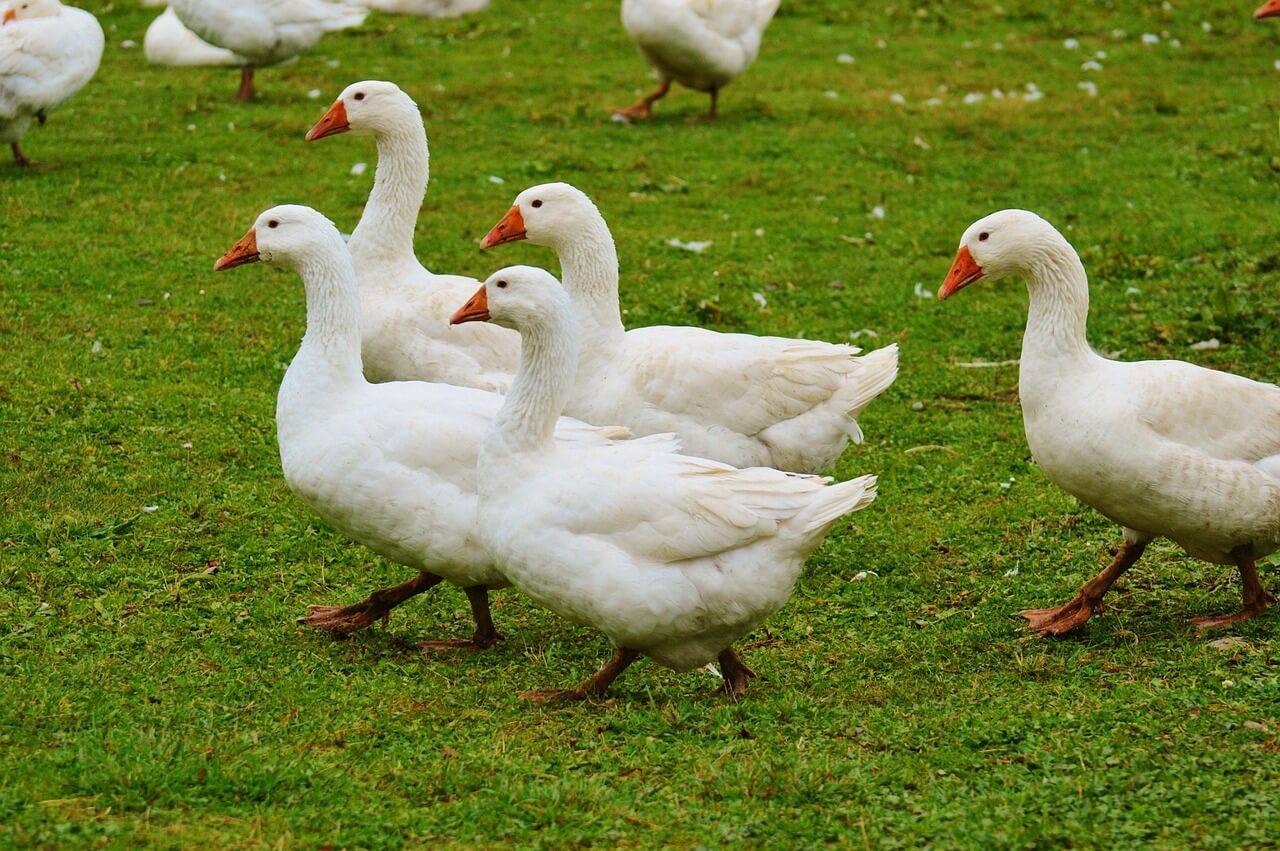
Yes, geese are incredibly easy to raise. They are hardier than chickens, self-sufficient, and usually make excellent moms.
Because geese are grazing animals, they require little by way of feed. However, insoluble grit should be made available to help with digestion.
They tolerate cold and heat well when provided with shelter but do require access to water. Although a pond isn’t essential, water deep enough to submerge themselves is, a large tub will suffice.
Goose Breeds
Depending on why you want to raise geese, choosing the right breed can be essential to your success.
In this video, some of the most popular goose breeds are discussed:
Can You Raise a Single Goose?
You can raise a single goose, but they are always happier in flocks. Most geese are monogamous and have just one partner for their entire lives.
If you do raise a single goose, then due to their sensitive nature, they will do better if you give them plenty of attention and companionship.
Some people use a single goose to keep with their chicken flock and act as a guardian. They are great at sounding the alert whenever danger is near.
Larger flocks of geese are best not kept with chickens, as they are very territorial and may kill them.
How to Raise a Baby Goose
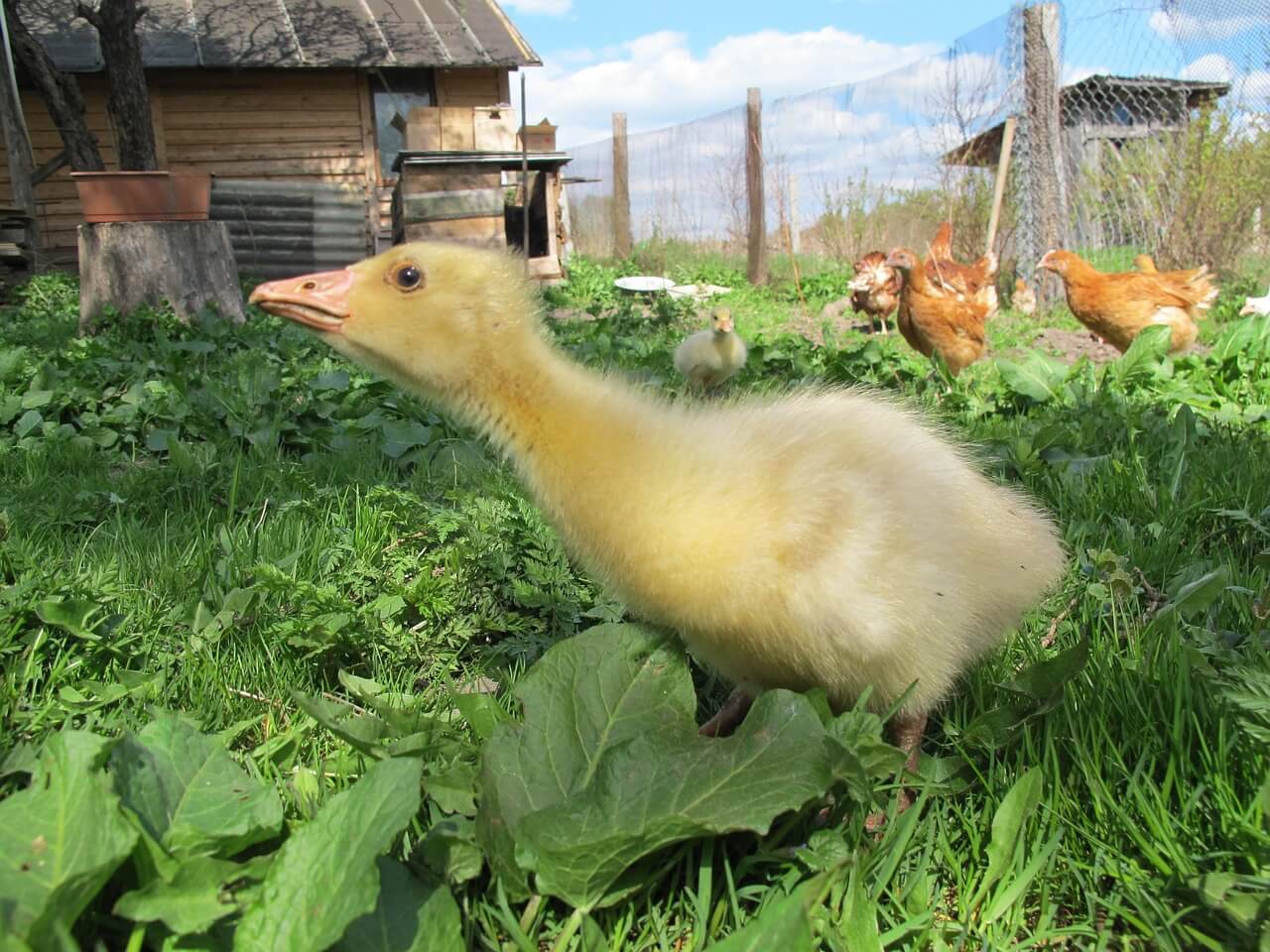
Goslings require a lower temperature and time in a brooder than chickens. Many types feather up quickly and grow fast, so you won’t need to be taking care of them for very long.
What you’ll need:
Brooder
A well-ventilated box or a dog crate can make an excellent brooder. You’ll need to heat it, either with a protected heat mat (geese have sharp claws) or a heat lamp. Remember that lamps can cause fires, and bulbs sometimes blow, leaving your gosling cold.
Feed
Goslings eat lots of food. You can feed them unmedicated chick starter or grower food specially designed for geese and ducks.
Water
Geese are waterfowl and, as such, need plenty of water. As tiny babies, it is safest to provide a water container they can only get their beaks into, but after a week or two, they can have a sturdy pan that they can play in. To begin, it is better to dry them off after bathing, so they don’t get cold.
Once they get their oil glands and can grease their feathers, you can let them bathe in deeper water without the need to dry them, which they will love.
Grazing
Provided it’s dry and the outside temperature is above 50°F, they will enjoy playing outside and grazing in the sun for a few hours. Don’t leave young goslings unattended unless you have a secure, covered run to use. They are very easy prey for predators, including cats and dogs.
At three weeks of age, providing it’s above 50°F, it isn’t raining, and you have secure fencing, they can be left out all day.
By 8 weeks of age, giving them free access to water for swimming and adlib pelleted goose food is best.
Shelter
Whenever outside, they must have a shelter and always be safely shut away at night.
By 12 weeks, they will be entirely independent with a complete set of adult feathers. Whatever their age it is safest to bring them inside at night to keep them away from predators.
How Long Does it Take to Raise a Goose?
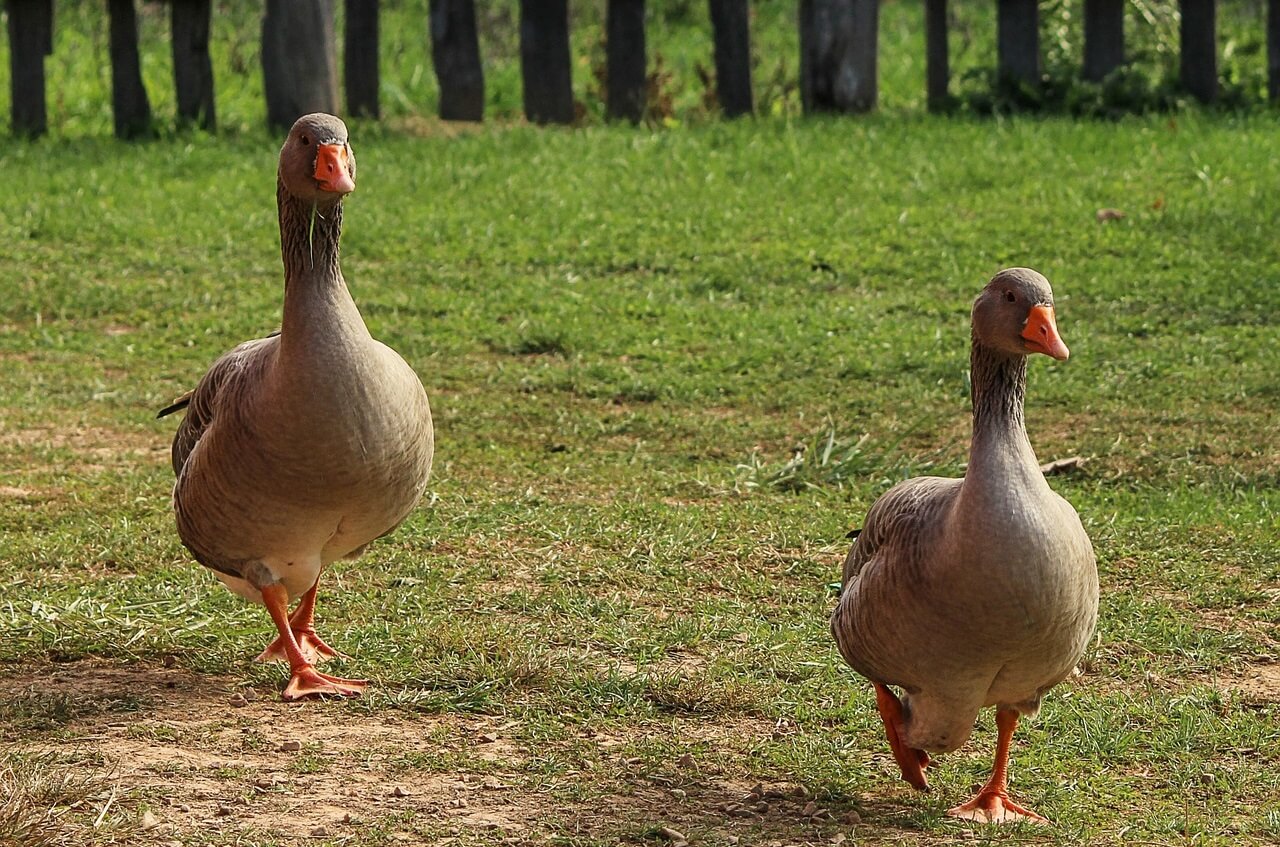
For a goose to grow to full maturity can take two years. The exact length of time varies depending on the breed of goose.
Goslings will grow their complete set of adult feathers by the age of 11 weeks. When they hatch, they have very soft down, which will molt in exchange for juvenile plumage at around 3 to 5 weeks.
Baby geese are cared for by their parents until they are around 10 weeks of age. Surprisingly it is the father (gander) who will aggressively protect his goslings.
Often the Mother goose needs to recover from the weight she lost from her time sitting on the nest to brood her eggs. She tends to let Dad do the babysitting.
Typically, young geese stay with their parents and siblings for the first year of life.
Raising Geese for Profit
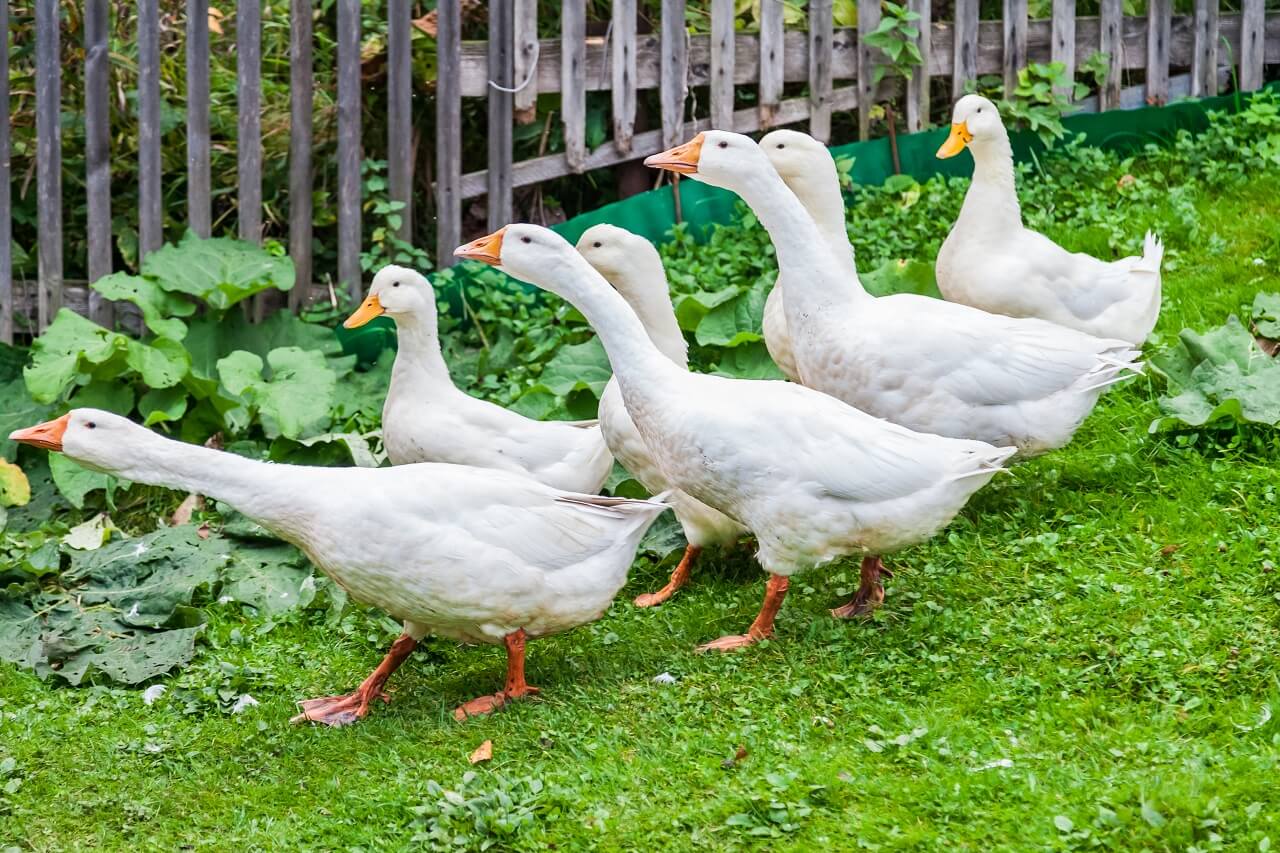
Because geese are hardy, disease-resistant, and easy to care for, they can be a good bet for business.
Unlike other poultry, geese are entirely vegetarian and like to graze short grass. If you have plenty of grass available, they are pretty cheap to keep as the amount of additional feed they require is minimal.
During the warmer months, providing the fresh grass supply is plentiful, geese do well on 80% grass and 20% feed. This needs to be accompanied by an ample supply of clean water.
Goose Meat
Geese are usually raised for their meat. Goose meat is dark and rich tasting and often sold as a specialty. It is particularly popular around Christmas time as an alternative to Turkey. This means it sells at a far greater price than chicken.
When fed correctly, geese are generally ready for processing by just 12 weeks of age. This allows for a large profit margin. This is, of course, dependent on their breed.
The best breeds of geese for meat are:
- Large Dewlap Toulouse, which weighs between 18 and 25 pounds
- Super African, weighing between 16 and 20 pounds
- White Emden, weighing around 15 to 20 pounds
In the right conditions, a goose can gain about a pound in weight every week. There are also some other side products (e.g. goose fat) that may be worth exploring.
Goose Eggs
Eggs from geese are enormous when compared to a chicken’s. They are great for baking, poaching, or scrambling.
The whites have a more gelatinous consistency than chicken eggs and whip up into sturdy meringues with taller peaks.
Due to their size, novelty, and rarity, the eggs command a higher price than chicken eggs. The best breed of goose for egg production is the Chinese goose, producing up to 60 eggs a season. They don’t lay in winter.
To maximize egg-laying, certain practices can be followed:
- Collect eggs in the late morning and early evening. This will help minimize breakages and ensure all eggs laid that day have been collected. Depending on how many geese you have, you may be required to gather them more often.
- Not collecting eggs regularly enough will promote broodiness in your geese. If a goose does go broody, put her into a bare broody coop to break the desire as soon as possible, as while broody, she won’t be laying any eggs.
- Artificial light can be used to stimulate early egg production. Like chickens, geese require a certain number of hours of daylight before they will lay.
Feathers/Down
Goose down is often used for stuffing pillows, cushions, throws, and clothing. It can be an excellent bi-product to sell if you raise meat birds.
The best down in the world comes from Hungary. This is because the birds are kept to maturity, so the down is fully grown and thicker.
Breeding
Breeding geese is another option. Selling goslings or young geese could give you a profitable return on your investment.
You could specialize in rare breeds or alternatively opt for the most popular ones, such as the Embden or Toulouse.
Hatching goose eggs isn’t particularly easy, and great care must be taken if you want to use an incubator.
More information can be found in our article – Why Isn’t My Goose Sitting On Her Eggs?
Conclusion
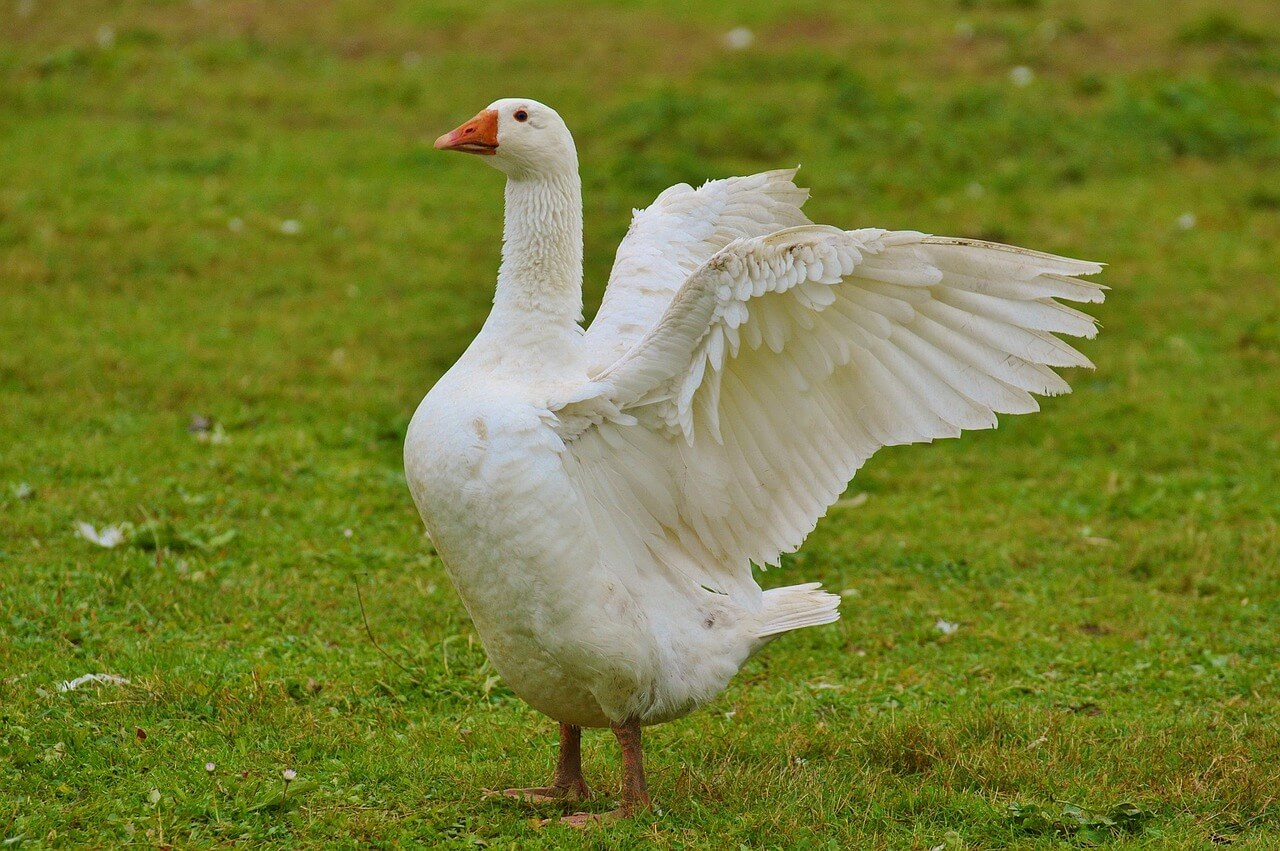
Geese, when handled correctly, can be very tame and friendly. They can be kept as pets and work very effectively as guard dogs.
Females are typically less aggressive than males. But, all geese are noisy and unsuitable for keeping in residential areas unless you want to drive your neighbors crazy…
I have kept both Toulouse and Embden geese and found them utterly delightful birds. They would greet me whenever I returned home and gather around me eagerly for their daily feed.
They’d wait impatiently while I washed out their bathing tub, then delight at taking turns to have a good dip in the clean water. Ducking their heads under and clacking their beaks as they surfaced.
Keeping geese is easy and can make good business sense, providing you do your homework first.
We hope you’ve enjoyed reading about how to raise a goose. There are more great articles in our goose series, so why not take a look at this one about clipping wings, or our guide on how to butcher a goose?
Thank you for the information. My 2 geese we got at their 6th & 8th day of hatching. They are now 10 weeks old, and very social. Will they fly away, or because we keep them up 75% of the time, and feed and change water often will they stay? They have not flown yet. They run and stretch out their wings , but no flight yet. We jst took them off flock it, and have been adding pellets over the past 3 weeks, and now only pellets.
is there a good info book I can purchase?
When can I let them out all day? Our 5 acres are totally fenced-we have horses, and is cross fenced multiple areas. The dogs only go out when we are out. We have Musgovie Ducks and are trying to slowly socialize them with Sonny & Cher. When can I walk them down to the pond and leave them without worry?
See I need a book!
Tank you for your time.
Hello Darren,
You don’t mention what breed of geese you have. But most domestic geese (the heavy breeds) won’t fly away. I had a problem one year with some young Embden geese who kept flying to a nearby lake, so I had to trim their flight feathers. The following year they no longer did it. If you have a pond you shouldn’t get that problem.
They will be fine to put outside all day now and have access to your pond, providing you don’t have predators on your land. If it’s very hot make sure they have somewhere to go to cool off.
As for a book “Keeping Geese Breeds and Management” by Chris Ashton is comprehensive.
I hope that helps!
Sara
What is the good ratio in rearing goose.i mean ratio of female to male
Hi, I need help please.
I want to have a single goose for a pet and security alarm for when I get my chickens..
During the years I was traveling earning a living, I was at a camp ground where the Canadian geese winter over and someone had gotten a single brown Goose
that lived at the campground year round.. He was so beautiful and had a Hugh personality..
Henry took to me and began coming up in the evening to sit ith me by the fire. He would settle down next to me and rest his head on my lap.
Every morning he was outside my door at 7am pecking on it wanting me to come outside with him..
I miss Henry and now live by myself on 4 acres with a creek.
What breed of goose do I want?
Thank you for you help.
waiting to find my Henry or Georgette..
Liz
I am not a goose expert but have two breeds and the Chinese White geese are lovely to look at (known as ‘Swan’ geese) but they are more acive and can be agressiv (especially the males) which make them good guardians of the land you’re on, but my Emden geese are much calmer and not as imposing in stiture although they are heavy.